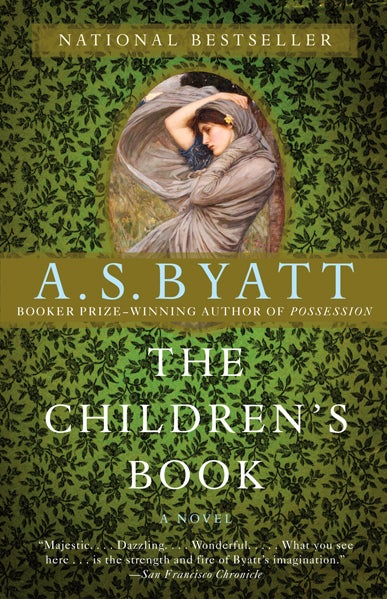Posted by Cobalt | Posted in academic, fairy tales, Victorian | Posted on 7:49 AM

Rating: 4.5/5 stars.
I adore A.S. Byatt more than I can coherently explain. Or at least I've loved the two books of hers that I've read so far, Possession and The Children's Book. I picked up my copy of Possession in a creaky little used bookstore in Norwich, England, and my memory of that February will be forever tinged with the flavor of that particular story -- the delicious combination of scholarly mystery, intertwining histories and rich prose that kept me reading long into the cold English nights.
It's the language that does it for me; Byatt has a style that reads almost like poetry, and she can weave such an intricate tapestry that it reminds me of standing in a restored music room in the Victoria & Albert museum, transported by the gleaming surfaces as much as the weight of history beneath them. Incidentally, The Children's Book features the V&A almost as another character itself; it's set during the end of the nineteenth century, straddling the end of Victoria's reign and the transition to the Edwardian era.
The book begins in the museum, with two boys spying on another at work sketching an artifact -- but it rapidly expands to encompass the trials and drama of several large, interconnected families who are all caught up in the shifting social, artistic, political and religious currents of the times. Normally I don't like sprawling epic family works -- it's hard to keep the characters straight, for one thing -- but Byatt caught me in a web of fairy myth and secrets that kept me reading until far too late at night (again).
I can see where people could argue that the book is too long; there are many passages that feel like long, elaborate exercises in stage setting, more like a study of Victorian England than any plot development -- but since I've always been interested in this time period, it felt like a pleasant diversion instead of a chore. Plus, I was learning a lot -- I had no idea that the suffrage movements in England were so viciously, frantically violent. This wasn't a bunch of ladies in ruffles complaining over tea; marching down the street, smashing shop windows, and oh yes, blowing up houses all made the agenda. And the government response was no less extreme, force-feedings and brutal beatings...with the added strain of class conflict and the looming aggressions of World War I, it must have felt like the world was shaking apart.
Which is probably why children's stories and fairy tales suddenly became popular, as people took refuge from an increasingly chaotic world in creations of fantasy. Not that fairy tales were all fun and games; these are the ancient, shadowed myths that the Brothers Grimm found, not the sanitized pastel-colored romps on most children's shelves today. This world is disturbing and odd, but there are rules here, and something about the stories touches deeper in our consciousness -- Byatt's exploration of myth and fantasy seized my interest as much as her characters' struggles, if not more so.
I could go on (and on), but at some point the rambling must end, so I'll sign off for now with a sigh for my lost bed partner. Even if this means I should be getting more sleep.

Comments (0)
Post a Comment